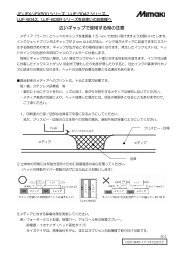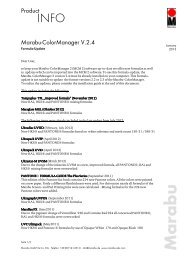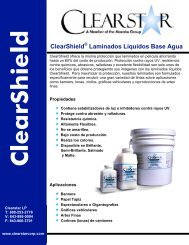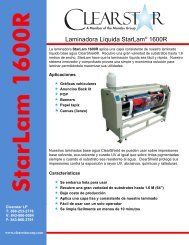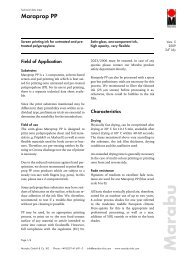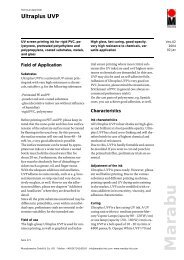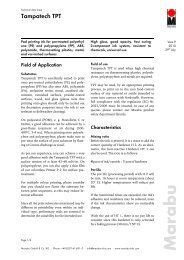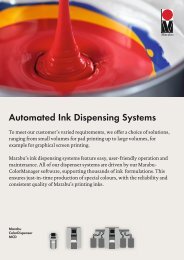Ultraglass UVGO - Marabu Printing Inks
Ultraglass UVGO - Marabu Printing Inks
Ultraglass UVGO - Marabu Printing Inks
You also want an ePaper? Increase the reach of your titles
YUMPU automatically turns print PDFs into web optimized ePapers that Google loves.
Technical Data Sheet<br />
<strong>Ultraglass</strong> <strong>UVGO</strong><br />
Curing<br />
<strong>Ultraglass</strong> <strong>UVGO</strong> is a fast curing UV-ink. A<br />
UV-curing unit with one medium pressure<br />
Mercury Vapour Lamp (180- 200 W/cm) will<br />
cure <strong>UVGO</strong> at a belt speed of 4800 passes/h.<br />
<strong>UVGO</strong> 170 Opaque White, all high opaque<br />
shades and bronzes cures more slowly due to<br />
their high amount of pigments (approx. 3300<br />
passes/h).<br />
The curing speed of the ink is generally dependant<br />
upon the kind of UV-curing unit<br />
(reflector), number, age and power of the UVlamps,<br />
the printed ink film thickness, the selfcolour<br />
of the glass, as well as the number of<br />
passes of the UV-curing unit.<br />
Oven drying<br />
After UV-curing, the following oven drying<br />
forced by heat is necessary:<br />
160° C for 20 min. or 140° C for 30 min.<br />
By doing this, the best possible adhesion to the<br />
glass as well as high resistance is achieved.<br />
In the case of lower requirements to the final<br />
product, IR drying can be used or also<br />
completely done without IR or oven drying.<br />
The ink will post-cure within the first 24 hours<br />
and resistances can be tested only after that<br />
time. Preliminary tests, however, are always<br />
necessary.<br />
• domestic dish washer minimum 300<br />
cycles (65°C for 130 min with customary<br />
cleaner Type B/low alkaline detergent)<br />
• Winterhalter glass dish washer (85° C for<br />
3 min), minimum 3000 cycles<br />
• alkaline resistance: 2.3% of NaOH (80° C<br />
for 30 min)<br />
• 500 double rub strokes (350 g): ethanol<br />
and glass cleansing agent were found to be<br />
o.k.<br />
• 100 double rub strokes (350 g): acetone<br />
was found to be in order<br />
• resistance to perfume: after 24 h long term<br />
test o.k.<br />
• ink adhesion after frost test at -18° C was<br />
o.k.<br />
Bright colour shades, e.g. white, may darken if<br />
the print is constantly exposed to temperatures<br />
>40° C.<br />
Range<br />
Basic Shades - System Ultracolor<br />
922 Light Yellow 952 Ultramarin Blue<br />
924 Med. Yellow 956 Brilliant Blue<br />
926 Orange 960 Blue Green<br />
932 Scarlet Red 962 Grass Green<br />
934 Carmine Red 970 White<br />
936 Magenta 980 Black<br />
950 Violet<br />
High-opaque shades<br />
Fade resistance<br />
Pigments of medium to high fade resistance are<br />
used in the <strong>Ultraglass</strong> <strong>UVGO</strong> ink type. Owing<br />
to the binding agent used, however, all <strong>UVGO</strong><br />
shades are suited to a limited outdoor use of up<br />
to 3 months.<br />
Stress resistance<br />
The following resistances are referred to ovendried<br />
prints:<br />
Page 2/5<br />
122 Light Yellow<br />
132 Scarlet Red<br />
152 Ultramarine Blue<br />
162 Grass Green<br />
170 Opaque White<br />
180 Opaque Black<br />
Etch imitations<br />
913 Milky matt<br />
914 Satin Gloss Transparent<br />
916 Structured<br />
<strong>Marabu</strong> GmbH & Co. KG ⋅ Phone: +49 7141 691 0 ⋅ info@marabu-inks.com ⋅ www.marabu-inks.com<br />
<strong>Marabu</strong>



